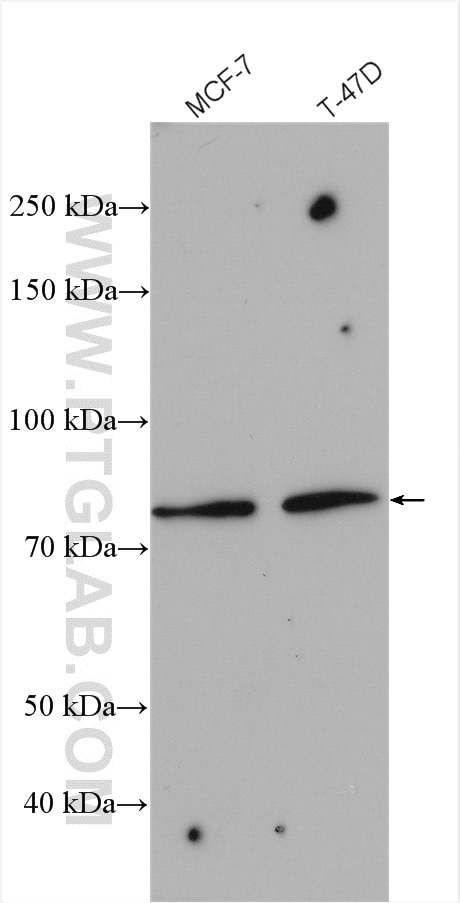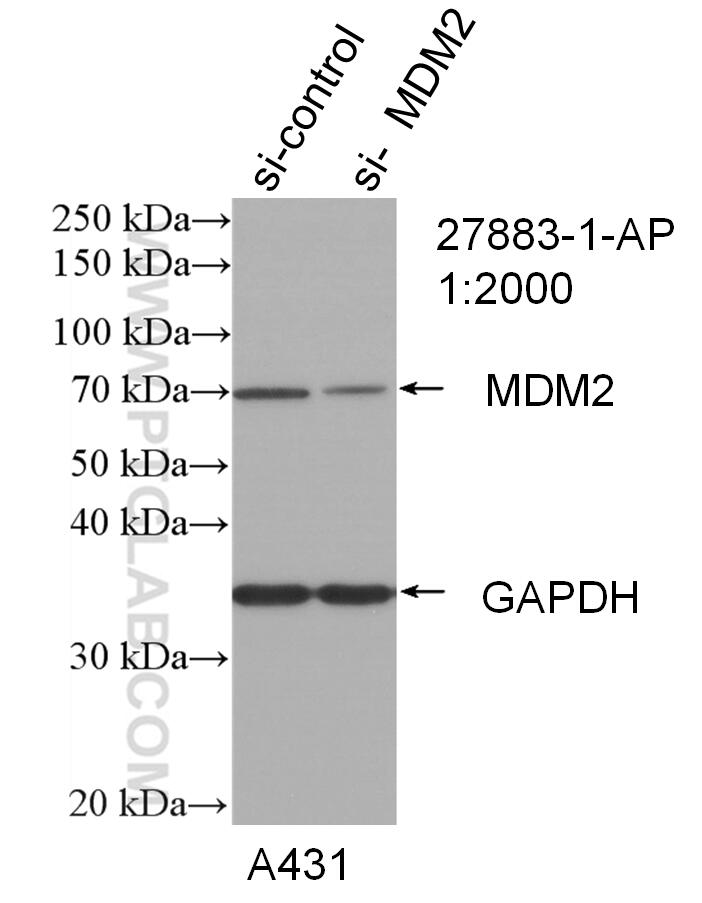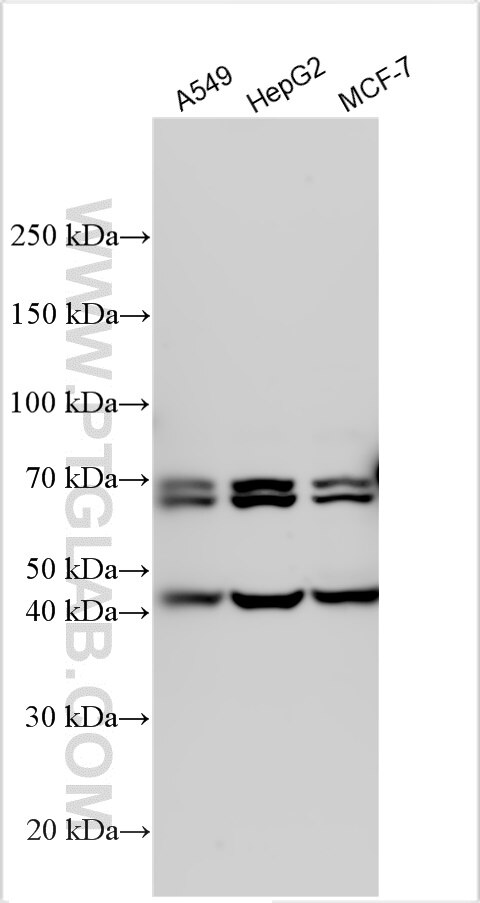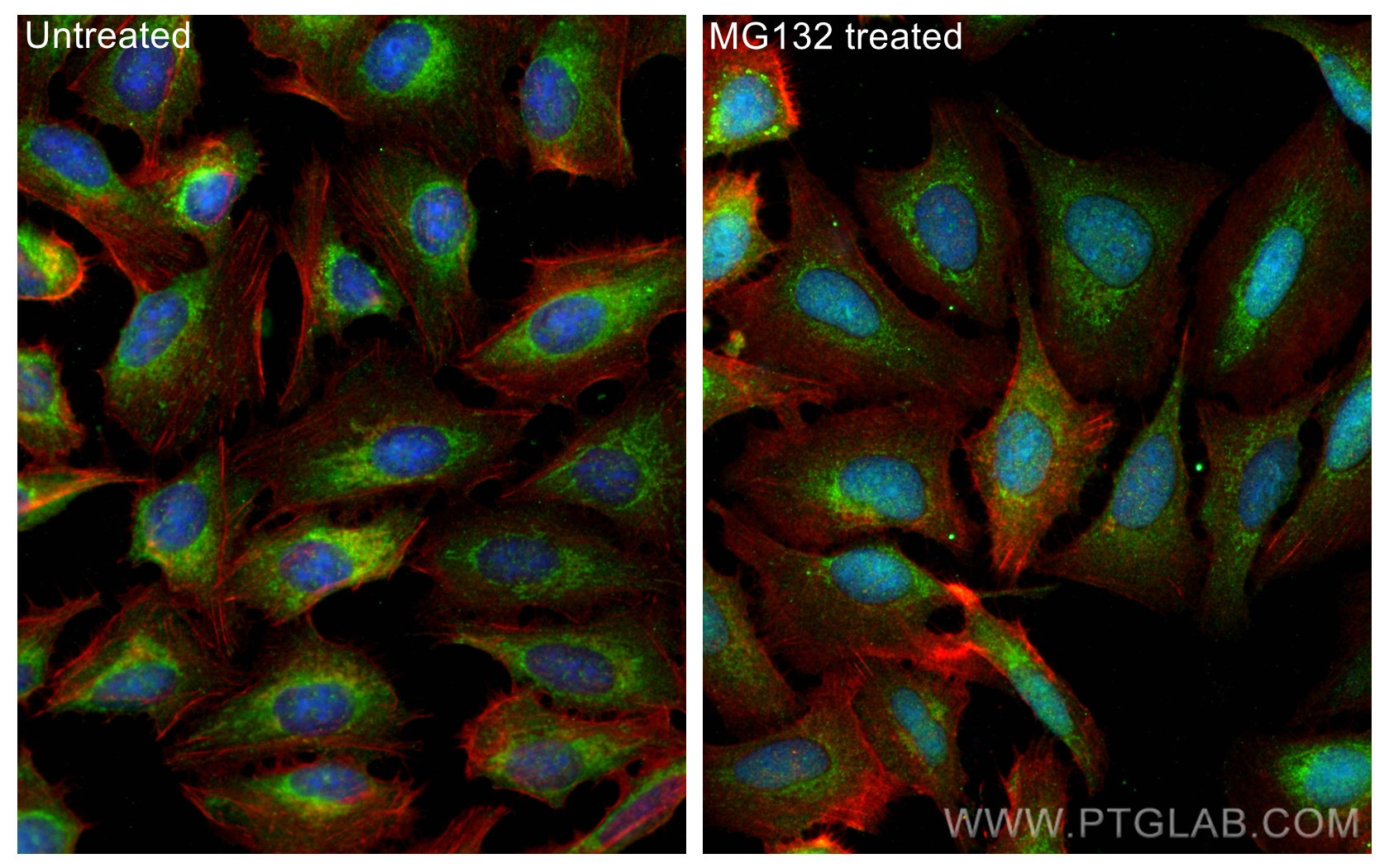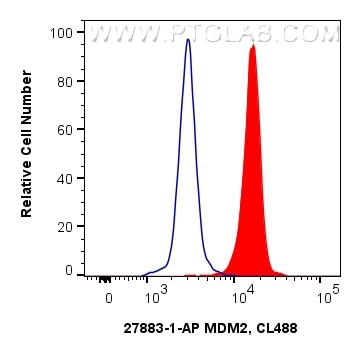Validation Data Gallery
Tested Applications
| Positive WB detected in | MCF-7 cells, A431 cells, A549 cells, HepG2 cells, T-47D cells |
| Positive IF/ICC detected in | MG132 treated U2OS cells |
| Positive FC (Intra) detected in | HeLa cells |
Recommended dilution
| Application | Dilution |
|---|---|
| Western Blot (WB) | WB : 1:500-1:3000 |
| Immunofluorescence (IF)/ICC | IF/ICC : 1:200-1:800 |
| Flow Cytometry (FC) (INTRA) | FC (INTRA) : 0.40 ug per 10^6 cells in a 100 µl suspension |
| It is recommended that this reagent should be titrated in each testing system to obtain optimal results. | |
| Sample-dependent, Check data in validation data gallery. | |
Published Applications
| KD/KO | See 3 publications below |
| WB | See 28 publications below |
| IHC | See 1 publications below |
| IF | See 5 publications below |
| CoIP | See 3 publications below |
Product Information
27883-1-AP targets MDM2 in WB, IHC, IF/ICC, FC (Intra), CoIP, ELISA applications and shows reactivity with human samples.
| Tested Reactivity | human |
| Cited Reactivity | human, mouse, rat |
| Host / Isotype | Rabbit / IgG |
| Class | Polyclonal |
| Type | Antibody |
| Immunogen | MDM2 fusion protein Ag27255 相同性解析による交差性が予測される生物種 |
| Full Name | Mdm2 p53 binding protein homolog (mouse) |
| Calculated molecular weight | 55 kDa |
| Observed molecular weight | 75-85 kDa, 57-60 kDa, 40-55 kDa |
| GenBank accession number | NM_001145337.2 |
| Gene Symbol | MDM2 |
| Gene ID (NCBI) | 4193 |
| RRID | AB_2881003 |
| Conjugate | Unconjugated |
| Form | Liquid |
| Purification Method | Antigen affinity purification |
| UNIPROT ID | Q00987 |
| Storage Buffer | PBS with 0.02% sodium azide and 50% glycerol , pH 7.3 |
| Storage Conditions | Store at -20°C. Stable for one year after shipment. Aliquoting is unnecessary for -20oC storage. |
Background Information
What is the cellular localization of MDM2?
MDM2 is predominantly localized in the nucleoplasm.
What is the tissue specificity of MDM2?
MDM2 is non-specific, expressing ubiquitously in the brain, heart, kidney, skin, and other tissues. Certain
isoforms only express in cancerous cells and not normal tissue.
With what other molecules does MDM2 interact?
Most notably, the oncogene protein MDM2 regulates transcription factor p53 by binding its transcriptional
activation domain and by E3-ubiquitin ligase activity. Ribosome proteins rpL5, rpL11, and rpL23 also bind to
MDM2, inhibiting E3 ubiquitin ligase activity and promoting the p53 pathway.
What competes with MDM2 activity?
Nutilin-3 was designed to compete with MDM2 in binding with p53, inducing activation of the p53 pathway.
What is the role of ubiquitination in MDM2 activity?
While p53 is also affected by other post-translational modifications, its stability is determined by ubiquitination
mediation of MDM2, suppressing p53 transcriptional regulation and leading to the proteosomal degradation of
p53.
How is MDM2 associated with cancer?
MDM2 inhibits the activity of the tumor-suppressive protein p53, which serves as an important factor in
promoting DNA repair or activating apoptotic pathways. Loss of p53 is associated with tumor development
and growth.
What is the human ortholog of MDM2?
Human double-minute type 2 (HDM2)
In what cellular circumstances does the p53-MDM2 complex dissociate?
Cellular stress or DNA damage result in the phosphorylation and activation of p53. Phosphorylation also
prevents p53-MDM2 interaction.
Where is the gene located?
Hdm2 is located on human 12q15.
Mdm2 is located on murine 10 D2.
PMIDs: 24309898, 29584707, 9840926, 28714398
Protocols
| Product Specific Protocols | |
|---|---|
| WB protocol for MDM2 antibody 27883-1-AP | Download protocol |
| IF protocol for MDM2 antibody 27883-1-AP | Download protocol |
| Standard Protocols | |
|---|---|
| Click here to view our Standard Protocols |
Publications
| Species | Application | Title |
|---|---|---|
J Clin Invest ZFP36L2 suppresses mTORc1 through a P53-dependent pathway to prevent peri-partum cardiomyopathy in mice. | ||
Mol Metab Multi-Omics after O-GlcNAc Alteration Identified Cellular Processes Promoting Aneuploidy after Loss of O-GlcNAc Transferase | ||
Eur J Med Chem Development of hybrid aptamers-engineered PROTACs for degrading VEGF165 in both tumor- and vascular endothelial cells | ||
PLoS Pathog Pseudorabies virus inhibits progesterone-induced inactivation of TRPML1 to facilitate viral entry | ||
Bioorg Chem Design, synthesis and biological evaluation of novel pyrrolidone-based derivatives as potent p53-MDM2 inhibitors. |
